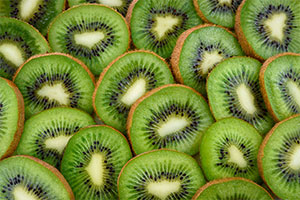Kiwi
Kiwi, also known as kiwifruit, is a member of the Actinidiaceae botanical family.
Native to China and first commercially grown in New Zealand, kiwi is now grown all over the world, including California.
Common commercial kiwi varieties include the Hayward (with brown, fuzzy, edible skin, green flesh and tiny black seeds) and the Gold kiwi (with smooth, edible, tanned skin, yellow flesh and tiny black seeds).
Nutrition Information
Kiwi is a good source of fiber, folate, and vitamin E and an excellent source of vitamin C and vitamin K.
- Fiber supports digestion by helping to prevent constipation.
- Folate assists with red blood cell formation and reduces the risk of neural tube birth defects.
- Vitamin E contributes to the formation of blood vessels and healthy immune function.
- Vitamin C promotes collagen and connective tissue formation, wound healing, and a healthy immune system.
- Vitamin K supports bone health and blood clotting.
Purchasing, Storing and Preparing
- Purchase kiwi year-round in grocery stores.
- Choose kiwi with goldish or brown skin.
- Avoid those with a greenish hue, bruises, dark spots, or if the skin is wrinkled.
- Ripe kiwi will give slightly when gentle pressure is applied.
- Unripe kiwi will be more firm, but will ripen if left out on the counter for 3-5 days. For quicker ripening, place kiwi in a paper bag with a banana.
- Store on the counter until ripe, then store in the refrigerator to stop from further ripening.
- Prepare kiwi by washing its outer skin. Next, slice off both ends of the kiwi with a knife. Now, slice the kiwi in half then insert a spoon between the flesh and the skin and rotate to loosen the flesh from the skin. Or after cutting off the ends, stand the kiwi up and slice the skin off in strips until all is removed. Slice or dice as desired.
- Kiwi can be eaten raw or cooked. The skin is also edible.
- Eat kiwi plain or add it to smoothies, parfaits, salsa, make into a jelly or jam, or add to baked goods.
Nutrition Facts
Kiwi fruit, 1/2 cup raw
- Calories: 52
- Protein: 0.95 g
- Fat: 0.39 g
- Carbohydrate: 12.6 g
- Fiber: 2.7 g
- Calcium: 31.5 mg
- Iron: 0.21 mg
- Magnesium: 14.4 mg
- Phosphorus: 30.6 mg
- Folate: 23.4 µg
- Vitamin A: 3.6 µg
Via fdc.nal.usda.gov
